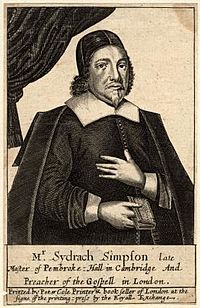Sidrach Simpson facts for kids
Sidrach Simpson (born around 1600, died 1655) was an important English Independent minister. He was one of the main leaders of the Independent group during a big meeting called the Westminster Assembly.
Contents
Early Life and Education
Sidrach Simpson came from a region in England called Lincolnshire. He went to Emmanuel College and Queens' College, Cambridge at the University of Cambridge. He was a student who received help with his costs while studying there.
A Minister's Journey
Sidrach Simpson lost his position in the Church of England because of changes made by a powerful church leader named William Laud. After this, he moved to the Netherlands and worked as a minister there for a while.
The Westminster Assembly
Later, he returned to England and became a key figure in the Westminster Assembly. This was a large meeting of religious leaders. They met to decide how the Church of England should be organized and what its beliefs should be.
Simpson was part of a special group known as the "Five Dissenting Brethren." These five ministers had different ideas from many others in the Assembly. They believed that each local church should have more control over its own decisions. This idea is called Congregationalism.
The other members of this group were William Bridge, Jeremiah Burroughs, Thomas Goodwin, and Philip Nye. Like Simpson, Burroughs had also been a minister in Rotterdam, Netherlands.
In 1644, this group wrote a document called An Apologeticall Narration. They presented it to the English Parliament. This document explained their beliefs and why they thought churches should be more independent.
Later Years and Challenges
In 1650, Sidrach Simpson became the head of Pembroke Hall, Cambridge, which is a college at Cambridge University. He also held important positions as a church leader, or rector, in London. He worked at St Mary Abchurch and later at St Bartholomew-by-the-Exchange.
Towards the end of his life, his religious ideas became quite strong and sometimes unusual. Oliver Cromwell, a powerful leader in England at the time, even had Simpson put in prison for his very direct preaching.
 | Jewel Prestage |
 | Ella Baker |
 | Fannie Lou Hamer |


